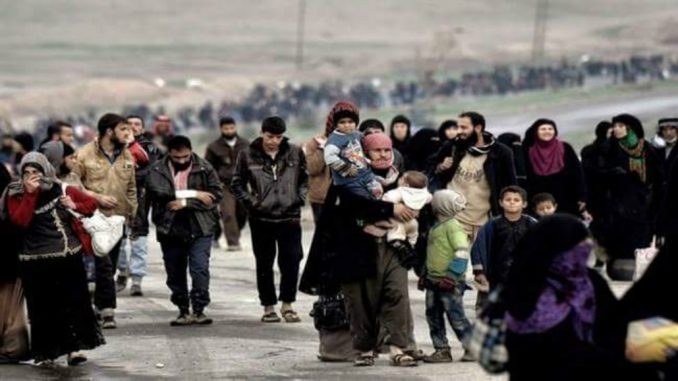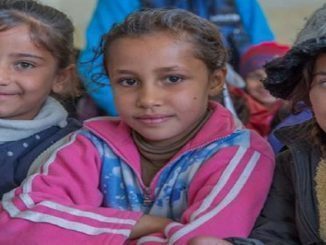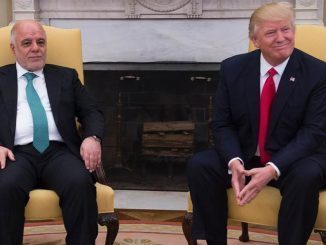
A number of dead bodies have been washing up along Iraq’s Tigris River bearing marks of torture, while no one knew who they were belonging to or who killed them.
At the height of its power two years ago, Islamic State ruled over millions of people in territory running from northern Syria through towns and villages along the Tigris and Euphrates river valleys to the outskirts of Baghdad in Iraq.
However, ISIS’s territory is shrinking rapidly since last year as the US-led coalition, the Turkish-backed forces, and the Russian-backed Assad regime forces have fierce fights against its forces in both Syria and Iraq.
The United States is providing air and ground support to Iraqi and Kurdish forces trying to dislodge the hardline group from Mosul.
Iraqi forces captured the eastern side of Mosul in January after 100 days of fighting and launched their attack on the districts that lie west of the Tigris river on Feb. 19.
Islamic State militants retreated across the Tigris river to western districts of Mosul, where they are using mortars, sniper fire, booby traps and suicide car bombs to fight the offensive carried out by a 100,000-strong force made up of Iraqi armed forces, regional Kurdish peshmerga fighters, and Iranian-trained Shi’ite paramilitary groups.
Dead bodies floating in Tigris
Most of the bodies that wash up on the bridge in northern Iraq have their hands bound, eyes blindfolded and a bullet to the back of the head.
The ones that have been dead longest float on the surface, buoyed by the gasses produced as they decompose. Those killed recently tumble in the current that drags them down the River Tigris.
Their identity of the victims and that of their killers is a mystery.
“Nobody knows,” said a mother who has seen more than half a dozen corpses drift past her house overlooking the river near the town of Qayyara in recent months. “Much more could have gone past in the night.”
Islamic State militants were driven out of Qayyara in August last year. The town is 60 km down the Tigris from Mosul, the last major bastion where the fighters are still battling against government forces.
Some officials say the floating dead are victims of the militants, who killed hundreds if not thousands of opponents when they ruled the area.
Getting revenge, killing innocents
Others, however, say the evidence points elsewhere: toward extra-judicial killings of people accused of having joined the militants, now that the territory is under government control.
“Most of it is score-settling,” said an intelligence officer in Qayyara. That includes the killing of Islamic State suspects by elements of the security forces: “There are security agencies that say ‘I won’t bother myself with the investigation’.”
The local police chief, Colonel Fawzi Jameel Sultan, insisted that the bodies were mostly victims of the fighters. Either the corpses had floated down from insurgent-held Mosul, or they had only just been dredged up by spring rain, killed last year when the militants still controlled the area.
But a senior officer in the security apparatus contradicted him. “Not all of them were killed by ISIS,” the officer said.
The bodies could not have floated down from Mosul because there are barriers around 30 km south of the city to catch debris, said the officer on condition of anonymity. And some are only one or two months old, killed long after the fighters left.
Once the bodies are identified, it will be easier to discern a motive, he said: “If the (victim) worked for ISIS that means the perpetrators were probably people who were harmed by ISIS.”
Human Rights Watch Iraq researcher Belkis Wille said that if the victims were not killed by Islamic State, the description of bound and blindfolded bodies “strongly suggested” they were examples of extrajudicial executions by “state-affiliated forces”, rather than vigilante justice.
Although the militants have been driven out, locals complain that people who cooperated with Islamic State remain in the area.
The line between extra-judicial killing by the state and private vigilantism is blurred because many members of the security forces have been personally affected by the militants and wish to avenge the deaths of friends and relatives.
A patchwork of forces, including local and federal police, several intelligence agencies and more than three dozen government-backed Sunni tribal militia, makes it more difficult to determine who might be responsible.
The mystery is most acute for the relatives of those who go missing.
The end of the battle for Mosul will also leave Iraq struggling with thorny political issues including control of recaptured territory in the north that is claimed by both the country’s autonomous Kurdish region and its federal government.
And Iraq will still be contending with the effects of the war — citizens killed, wounded or missing, hundreds of thousands displaced, houses, shops, and infrastructure wrecked, children years behind in school — for years to come.



